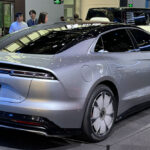On a table at the office of the Waukegan Township Democrats sits a box of postcards with Wisconsin addresses that were collected during a postcard-writing pizza party to help turn out voters there. Leaning against the table are homemade Harris-Walz signs. “We know they’re handing these out everywhere in Wisconsin,” said Matt Muchowski, chair of the Democratic club.
“Here in Waukegan, it’s been harder to get a hold of Harris yard signs, so we’re printing out our own.” One reason they've been in short supply: Waukegan is in Illinois, which is not a presidential swing state. It just sits across the border from one.
Muchowski said this is emblematic of the limited attention cities outside of swing states receive from presidential campaigns. The United States' unique Electoral College system, which replaces the popular vote, puts disproportionate voting power in the hands of a relative few states that are evenly divided politically and ensures that the majority of campaign dollars — and attention from the presidential candidates — goes to those states. The lack of attention leaves voters in much of the country feeling as if they and the issues they care about have been sidelined.
It's a dividing line that is felt acutely in places such as Waukegan, one of Chicago’s farthest-flung suburbs. The last time a presidential candidate set foot in the working class, majority Latino city was when former President Donald Trump landed at its airport in 2020. Trump walked o.


















